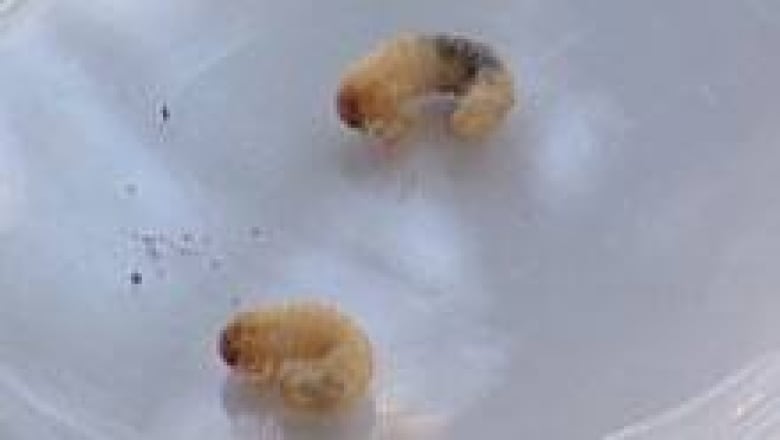Lawn-destroying beetle survived winter
Chafer beetle grubs are destroying lawns across Fredericton again this year
The lawn-eating European chafer beetle grub did not die over the winter as some Fredericton city officialswould have hoped.
Don Murray, city forester of the parks and trees division,said the beetle larvae survived quite well over the winter and has spread throughout Fredericton.

The grubs areresponsible for eating lawns city-wide, where the damage has beensevere.
Winter frost, deep in the ground,was thought to kill the beetles or at least keep their numbers in check, but Murray said it has been quite a while since New Brunswick had a "traditional" winter.
"I think that's what happened this past year. We didn't have that deep frost that goes down three or four feet into the ground and these things have survived," Murray said.
"Its not as big of a deal here in the city. We do see parks that have been attacked by this beetle and we either go out and do an over-seed after the damage is done... or we just leave it and let it fill in naturally," he said.
Recommendations for a chafer beetle grub problem
Even after over seeding, the beetle's larvae would likely come back next yearif the province has another mild winter.
Murray recommends plantingannuals and perennials,which the grubs won't devour, instead of grass.
Murray said the municipality will try to educate the public about how to prevent spreading the beetle larvae and how to manage an infestation.
"It's going to be a pest we may have to learn to live with. There's a very small window of applying nematodes to the larvae when it's feeding... and the problem with nematodes is that if you place them in the ground at the wrong time, they're just not going to work," Murray said.
The nematodes are small, worm-like creatures that release pest-killing bacteria from their gut.
But thenematodes must be applied at the right time. If they're exposed to strongultraviolet light they die, so they must be applied on a cloudy day.
The nematodes must also be applied at the right stage of the grubs' life cycle, usually in late July.
Murray said changing the way you manage your lawn can help reduce the effect the beetles have.
"We recommend when people mow their lawns, they leave their lawns a little bit long, like three inches, three and a half inches or longer. The lawn will look a little shaggy but the adults prefer to lay their eggs in lawns that haveshort grass," he said.
Pesticides are banned in Fredericton, so Murray said that will not be an option for homeowners who want to keep their lawns beetle-free.
"Especially if you don't know what stage this pest is in. We wouldrecommend you contact a licensed lawn company to see what they have for options," he said.
Damage is easy to recognize
The damage caused by the beetles is easy to recognize.
"You're going to go out in the morning andit's going to look like a rototiller went across your front lawn," Murray said."That's probably where the skunks or raccoons have been out at night and fed onthis little buffet of larvae that's been feeding on your grass."
During the daytime, other foragers take advantage of the bountiful pests.
"What you're going to see through the day is you're going to see grackles and starlings and probably some crows visiting and they'll be flipping over the sod and picking out these nice, white, macaroni-sized larvae," he said.
Murray said thechafer beetle grubs feed under the lawn, eating the roots right off the grass.
Hesuspects the pests came in on nursery plants imported to Fredericton.
"We don't claim it, we're going to have to learn to live with it or perform control measures," he said.












_(720p).jpg)


 OFFICIAL HD MUSIC VIDEO.jpg)
.jpg)



























































































